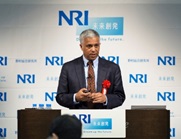
NRI hosted its third global regulation conference on October 12th, 2016. The purpose of the
conference is to share challenges and best practices of data management in the current evolving
regulatory environment with emerging new technologies such as RegTech.
The conference featured data management experts including Japan’s Financial Services Agency
(FSA), Bank of Japan (BOJ) and Enterprise Data Management Council (EDM Council) as well as CDOs at
global systemically important banks (G-SIBs).
This conference was Japan’s first conference specializing in data governance at financial
institutions and attended by more than 100 data practitioners from various banks, broker dealers as
well as insurance providers. The conference made it clear the benefits of improving data governance
lies in the fact that it can contribute to the company’s financial profits beyond compliance
of regulations.

Keynote 1 The Importance of Data Governance
Yoshio Horimoto, Director, Inspection Coordination Division Chief Administrator for Inspection
Monitoring, FSA
Mr. Horimoto spoke on the transition of financial administration, state of new audit, and approach
to achieve sustainability in business models in relation to data governance.
FSA has a sense of crisis regarding the current business models at Japanese financial institutions,
and developing sustainable business models is a top priority for management. Well established data
governance is prerequisite for management to exercise leadership, develop flexible strategy and risk
governance.

Introduction to Data Governance
Takaaki Kobayashi, Senior Researcher, NRI
Mr. Kobayashi introduced industry trends, general concept of data governance as an introduction for
the attendees to better understand the following presentations.
The Principles of Data Management
Michael Atkin, Managing Director, EDM Council

Mr. Atkin currently serves on data committee of Ministry of Finance as well as on Financial
Stability Board.
Mr. Atkin suggested the most important aspect of establishing data governance is setting a clear
goal in a top-down fashion. The ultimate goal of data governance for both regulators and financial
institutions is to more properly manage data, which requires collaboration between both public and
private sectors.

The Evolution of Data Management
John Bottega, Senior Advisor and Consultant, EDM Council
John Bottega, the first CDO in the industry, spoke on the challenges and measures of data governance
in the US, based on his extensive experience as CDO at Citi Bank and New York Federal Bank.
According to Mr. Bottega, to achieve success in data governance, both offensive and defensive
strategies are necessary. In addition, cross- functional collaboration is essential for better data
management. Data management means to realize the maximum values from the data, and Mr. Bottega
defined CDO’s responsibilities:
- be an agent of change enabling a culture of data management
- understand the meaning and function of all corporate data
- implement best practices
- collaborate with cross-functional executives.
EDM Council - Its charter and focus FIBO & DCAM
Michael Atkin, John Bottega, EDM Council
Mr. Atkin and Mr. Bottega introduced the history and activities of EDM Council.
The EDM Council was established in 2005 as a neutral business forum to establish standards and
define best practices for data management. Its members include CDOs at financial institutions, data
practitioners, regulators and vendors.
The EDM Council is the creator of The Data Management Capability Assessment Model (DCAM), a standard
set of evaluation criteria for measuring data management capabilities that has already been adopted
by more than 300 data practitioners.
The Financial Industry Business Ontology (FIBO) was also developed by EDM Council. FIBO provides a
description of the structure and contractual obligations of financial instruments, legal entities
and financial processes, and is used for harmonization of data across repositories as a common
language. Nine major global financial institutions have already adopted FIBO.
Keynote 2 Challenges and Outlook of Data Management
Tetsuya Taguchi, Director, Head of Financial Data Division, Financial System & Bank
Examination Department, BOJ

Mr. Taguchi spoke on the current status of data management and data collection in the US and Europe
while contrasting with the status quo in Japan, where the purpose of data management is still being
considered to comply with regulations. Japanese financial institutions need to learn this lesson to
provide financial services of greater added value and improve accuracy of data management.
New technologies such as API and big data tend to have compatibility with existing systems. Although
security concerns exist, these new technologies would provide financial institutions with more
options to utilize accumulated data without greatly changing the current systems.
Case Study
Data Management in Practice
Christopher Bannocks Chief Data Officer, ING Bank

Mr. Bannocks introduced ING’s global data management strategy and their data management in
practice.
ING considers data management as one of the crucial strategies for the whole company. Mr. Bannocks
and ING Bank believe the solid data management is necessary not only for complying with regulations,
but more importantly for staying ahead in the industry.
Case Study
Establishing Data Governance Control
Hironori Kamezawa, Managing Officer and CDO, MUFG

Mr. Kamezawa shared an in-depth look at MUFG’s data management strategy. MUFG, as an entity, has been promoting the improvement of risk management and business management systems that contribute to prompt and accurate management decisions. The initiatives included the development of systems to automatically collect data from each group company and the establishment of organizations and rules to support data reliability. Starting this year, MUFG has started to utilize the collected data for risk reporting regulatory reporting.
Case Study
Enhancing Data Governance with Utilization of IT
Keiko Kataoka, Assistant Manager, NRI

Ms. Kataoka introduced the case study where an IT solution has been utilized to improve data
governance.
Collibra is the data governance tool that is adopted by the highest number of financial
institutions. The unique characteristics of Collibra allows financial institutions to add
information of metadata and authorized administrators while maintaining the existing system. By
using Collibra, financial institutions can install the tool partially or experimentally to confirm
effectiveness while saving initial cost. As a real life example, a global financial firm implemented
Collibra at one location, and based on that result, the firm began to gradually do so across other
locations to improve overall data governance.
Case Study
Best Practices for Data Governance
Arka Mukherjee, CEO Global IDs

Mr. Mukherjee, 15 year CEO at Global IDs, presented the overview of Global IDs’ offerings and
case studies. Global IDs provides solution which helps CDOs by implementing data management. Global
IDs’ solution automates important process
of data management and improves the quality assurance.
Related Links
4 Things You Need To Know About RegTech
Global financial institutions' data governance:Implications of EDM Council data management
survey
NRI hosts second Global Regulation Conference with Numerix, MongoDB and MarcLogic
NRI hosted its first Global Regulation Conference with Fenergo